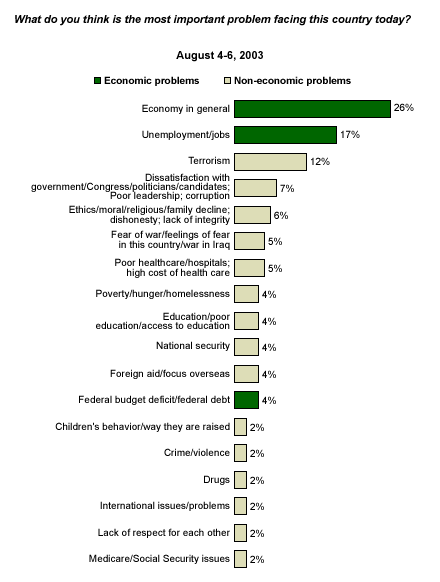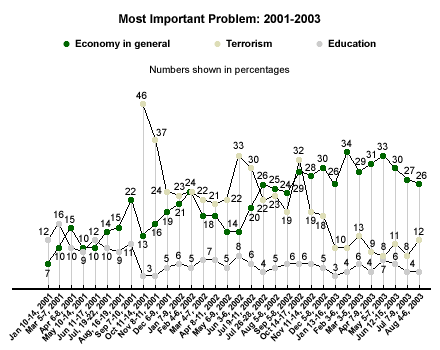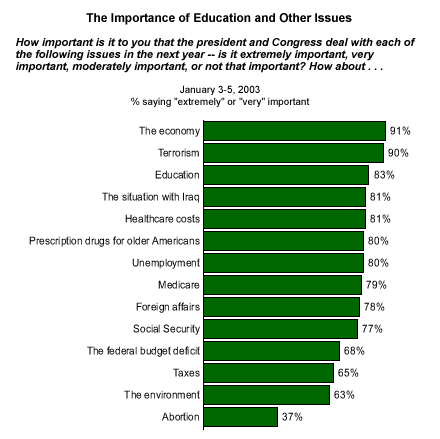Local newscasts may feature an abundance of "back-to-school" stories as kids return to class, but the shaky economy, terrorism, and the situation in Iraq still dominate the national news. Recent results of Gallup's question on the "most important problem facing the country today" reflect the emphasis of national headlines -- large percentages of Americans mention the economy (26%), unemployment (17%), and terrorism (12%) as the most important problem, according to Gallup's August 2003 poll*. Far fewer Americans, 4%, mention education.

Though education is not foremost on most Americans' minds when asked about the nation's most important problem, it will probably never be completely crowded from the public's list of national priorities. Despite the economic recession and the intense national focus on terrorism over the last two years, education has been a consistent fixture on the "most important problem" list. The percentage of Americans mentioning education as the nation's most important problem has ranged between 3% and 8% since October 2001.
From the late 1990s until shortly before the Sept. 11 attacks, education was frequently mentioned as the most important problem facing the country. In 2000, education generally rated at or near the top of the list of issues. In a Sept. 7-10, 2001, survey, 11% of Americans said that education was the most important problem for the country, second only to the economy (mentioned by 22%) and tied with unemployment (10%). Since then, the percentage of Americans mentioning education as the most important problem has not broken out of the single digits.

Education also ranks highly when Americans are asked to rate the importance of issues. For example, in January 2003, 83% of Americans deemed education to be "extremely" or "very" important for the president and Congress to deal with, putting it behind only the economy and terrorism on the list of issues tested.

Regarding the "problem" aspect of the "most important problem" question, most Americans see room for improvement in the public education system. Gallup's annual poll on confidence in institutions, last conducted in June 2003, indicated that only 40% of Americans have either "a great deal" or "quite a lot" of confidence in the nation's public schools (see "School Confidence Low After Decades of Reform" in Related Items). And according to the August poll, only about half (48%) are "completely" or "somewhat" satisfied with the current quality of public education in the nation, while 50% are dissatisfied.
Bottom Line
Although education isn't currently among the top issues that Americans mention as the nation's No. 1 problem, there's no question that education remains an "evergreen" issue in Americans' minds. It moves up and down the list of most important problems depending somewhat on what is in the news, and can get crowded from the top of the list when war and economic concerns loom. However, that doesn't mean that it isn't important. Education is one of several domestic issues -- together with the economy and healthcare -- that could play a significant role in the 2004 presidential election.
*Results are based on telephone interviews with 1,003 national adults, aged 18 and older, conducted Aug. 4-6, 2003. For results based on the total sample of national adults, one can say with 95% confidence that the margin of sampling error is ±3 percentage points.